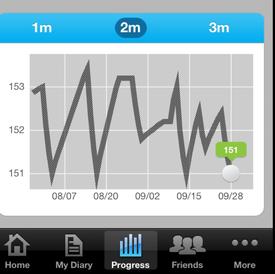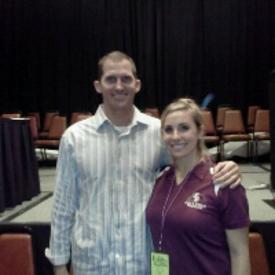The Starvation Myth

andreamelo1
Posts: 161 Member
The Starvation Myth
The idea that "not eating enough" causes the body to stop losing weight because it goes into "starvation mode" is a popular myth among dieters.
Article By: The Weight Watchers Research Department
Restricting calories during weight loss lowers metabolism1 because the body becomes more efficient, requiring fewer calories to perform the necessary daily functions for survival. Consequently, this can slow (but not stop) the anticipated rate of weight loss.
For example, if an individual needs 2,000 calories per day to maintain weight, reducing intake to 1,500 calories, assuming exercise stays the same, should provide a 1 pound per week weight loss (Note: 1 pound of weight is equivalent to about 3,500 calories). Furthermore, reducing to 1,000 calories should result in a weight loss of 2 pounds per week and going down to 500 calories a day should result in a weight loss of 3 pounds per week. However, if an individual actually reduces their intake to 500 calories, the weight loss would not likely be a steady 3 pounds per week because of the reduced metabolic rate. It would likely be around 2¼ to 2½ pounds. This "lower than expected" rate of weight loss is a lot different than "no" weight loss as the "starvation mode" notion proposes.
It is unclear as to whether the relationship between reduced caloric intake and a lower metabolism follows a straight path or becomes more pronounced the greater the caloric reduction. Some studies have found no significant reduction in metabolism until the caloric restriction is quite large (e.g. 800 calories or less per day).2 Others suggest a linear relationship with small reductions in metabolism accompanying small reductions in caloric restriction, with the gap increasing as the caloric deficit is enlarged.
While there is no biologic evidence to support the "starvation mode" myth, there may be behavioral reasons why weight loss stops when calories are severely reduced. Over-restriction of calorie intake, known as high dietary restraint is linked to periods of overeating, hindering successful weight loss.3 (For more information on dietary restraint, read the Science Center article, The Skill of Flexible Restraint).
Metabolism after Weight Loss
The good news is that after the weight-loss goal is achieved and weight has stabilized, it does not appear that the dip in metabolism is permanent. Several rigorous studies done at the University of Alabama in Birmingham showed that metabolism goes back to expected levels with sustained weight loss,4 discounting the theory that a lowered metabolism helps to explain the common phenomenon of weight regain following weight loss.
Weight Watchers Approach
The <PointsPlus system is designed to provide a caloric intake that supports a healthy rate of weight loss, produces a minimal reduction in metabolism and avoids inducing too-high levels of dietary restraint.
The idea that "not eating enough" causes the body to stop losing weight because it goes into "starvation mode" is a popular myth among dieters.
Article By: The Weight Watchers Research Department
Restricting calories during weight loss lowers metabolism1 because the body becomes more efficient, requiring fewer calories to perform the necessary daily functions for survival. Consequently, this can slow (but not stop) the anticipated rate of weight loss.
For example, if an individual needs 2,000 calories per day to maintain weight, reducing intake to 1,500 calories, assuming exercise stays the same, should provide a 1 pound per week weight loss (Note: 1 pound of weight is equivalent to about 3,500 calories). Furthermore, reducing to 1,000 calories should result in a weight loss of 2 pounds per week and going down to 500 calories a day should result in a weight loss of 3 pounds per week. However, if an individual actually reduces their intake to 500 calories, the weight loss would not likely be a steady 3 pounds per week because of the reduced metabolic rate. It would likely be around 2¼ to 2½ pounds. This "lower than expected" rate of weight loss is a lot different than "no" weight loss as the "starvation mode" notion proposes.
It is unclear as to whether the relationship between reduced caloric intake and a lower metabolism follows a straight path or becomes more pronounced the greater the caloric reduction. Some studies have found no significant reduction in metabolism until the caloric restriction is quite large (e.g. 800 calories or less per day).2 Others suggest a linear relationship with small reductions in metabolism accompanying small reductions in caloric restriction, with the gap increasing as the caloric deficit is enlarged.
While there is no biologic evidence to support the "starvation mode" myth, there may be behavioral reasons why weight loss stops when calories are severely reduced. Over-restriction of calorie intake, known as high dietary restraint is linked to periods of overeating, hindering successful weight loss.3 (For more information on dietary restraint, read the Science Center article, The Skill of Flexible Restraint).
Metabolism after Weight Loss
The good news is that after the weight-loss goal is achieved and weight has stabilized, it does not appear that the dip in metabolism is permanent. Several rigorous studies done at the University of Alabama in Birmingham showed that metabolism goes back to expected levels with sustained weight loss,4 discounting the theory that a lowered metabolism helps to explain the common phenomenon of weight regain following weight loss.
Weight Watchers Approach
The <PointsPlus system is designed to provide a caloric intake that supports a healthy rate of weight loss, produces a minimal reduction in metabolism and avoids inducing too-high levels of dietary restraint.
0
Replies
-
What I find interesting is that there is a lot of discussion about "starvation mode" and "eating back your exercise" on MFP but you don't see it in other forums. Actually I've never seen "eating back your exercise" on other forums (or I can't remember seeing it).0
-
I can't speak for the starvation mode thing but in my opinion the reason there is so much talk (or questions) about eating back exercise calories back is because I feel like MPF makes it a big deal. It says "oh hey you earned these calories back!!" Personally, I think people use it as an excuse to eat way more than they need to.0
-
/grabs popcorn
this should be interesting 0
0 -
This is what I believe-- and why I think that the "starvation mode" is an excuse for people that want to eat more. I understand thyroid issues or hormonal problems, but this isn't a given. I'm at 1100 - 1200 calories a day and not eating back my exercise calories. I am getting very strong and developing muscles in my legs, arms, and back. I have dropped over twenty pounds since May. Am I starving? I think not. Ridiculous.
You have to have a body fat percentage of like 10% before you go into true starvation mode. I was reading in the "Eat More to Weigh Less" forum today and they were eating way over their intake, then "cutting", then complaining about how their pants were getting tight and they gained 14 pounds an "oh I hope this works!" and they start dying after they "cut" their calories because they aren't used to it. Stop messing with your bodies! Eat until you're full and then STOP. Don't eat just to fulfill some caloric goal of 1500 or whatnot. My opinion.0 -
What I find interesting is that there is a lot of discussion about "starvation mode" and "eating back your exercise" on MFP but you don't see it in other forums. Actually I've never seen "eating back your exercise" on other forums (or I can't remember seeing it).
This! Before coming to MFP I never once heard anything anywhere about eating back your exercise calories. If that is "THE" way to go, why had I never heard about it before? My doctors and trainers had never mentioned it, not even once. You would think that if this was the secret to weight loss, everyone would know. Or maybe I live under a rock, which is possible. :bigsmile:0 -
I don't know about starvation mode but I do know that I have lost SOOO much more weight eating a healthy amount rather than back when I used to try to starve myself. I think it has more to do with the fact that I have more energy and can go harder during workouts. On top of that, I LIKE eating so screw eating very little haha.0
-
I don't know about starvation mode but I do know that I have lost SOOO much more weight eating a healthy amount rather than back when I used to try to starve myself. I think it has more to do with the fact that I have more energy and can go harder during workouts. On top of that, I LIKE eating so screw eating very little haha.
What is your definition of "starve"? 500 calories a day? Just curious. You look great so whatever you found that works for you works!
I eat 1200 and I feel like I eat constantly, they're just smart decisions (IMO, some might disagree).0 -
Come on people the word starvation mode is taken way out of context around here... No one is comparing anything to starving kids in Africa.... The way most use this term is that if you run to high of a caloric deficit your bodies metabolism slows to a crawl and your weightloss stalls... So in essence your body tries to protect itself aka starvation mode.... Then there is the other side "Eating more to lose weight" this comes in to play when you consume those calories burned during exercise. You have to fuel your body for the workouts you ask of it to do... It is as simple as that...0
-
Come on people the word starvation mode is taken way out of context around here... No one is comparing anything to starving kids in Africa.... The way most use this term is that if you run to high of a caloric deficit your bodies metabolism slows to a crawl and your weightloss stalls... So in essence your body tries to protect itself aka starvation mode.... Then there is the other side "Eating more to lose weight" this comes in to play when you consume those calories burned during exercise. You have to fuel your body for the workouts you ask of it to do... It is as simple as that...
Read the article, though: your metabolism *slows down*, doesn't stop. You will incrementally lose weight slower, but you will still be losing weight at a rapid pace. You don't stop losing weight from fat until you are under 10% bf. and hardly anybody on this forum applies to that.
Note: I'm not saying that eating more than 1200 calories is BAD for you or will make it hard to lose weight (on a case-by-case basis, of course), I'm just saying that there is nothing wrong with 1000-1200 calories a day for most people. It's just hard and takes some adjusting. You won't stop losing weight if you eat 1200 cals. You won't gain weight if you eat 1200 cals. And it is not an automatic "well you will lose muscle, then", either.0 -
What I find interesting is that there is a lot of discussion about "starvation mode" and "eating back your exercise" on MFP but you don't see it in other forums. Actually I've never seen "eating back your exercise" on other forums (or I can't remember seeing it).
This! Before coming to MFP I never once heard anything anywhere about eating back your exercise calories. If that is "THE" way to go, why had I never heard about it before? My doctors and trainers had never mentioned it, not even once. You would think that if this was the secret to weight loss, everyone would know. Or maybe I live under a rock, which is possible. :bigsmile:
Me either, and I've been haunting diet forums for many, many years. The 'eating back' is just a feature of the MFP plan, I think. And the silly warning about starvation mode probably fuels all the starvation hysteria here.
I think here's where people get screwed up. They see BMR and think they need to eat that TODAY. And they see the 'eat back' thing and think they also need to eat that TODAY. Like calories aren't all going in one big fund in your body.
Of course we feel happier with stable blood sugar and a sated appetite and we need fiber and vitamins and essential nutrients daily. But fuel for activity IS a calorie and a calorie IS a calorie. Our fuel needs have little to do with our daily nutrition needs. Which is exactly why 1200 works as a floor for people of all sizes and activity levels. Because you need the nutrients in food that feed a human each day. You don't need to fuel your workouts or BMR with food each day. Your body uses stored calories for whatever deficit you create each day.0 -
This is my fitness pal, not my weight lose pal. Some people are either trying to gain or maintain a weight, while training to run a marathon, or Ruck march 12 miles with 50 pounds of gear on in under 3 hours.
Thats to say, we are all here for different reasons and different things work for different people. But if your trying to maintain or loose weight at a health pace while doing intense training you need to eat.0 -
Come on people the word starvation mode is taken way out of context around here... No one is comparing anything to starving kids in Africa.... The way most use this term is that if you run to high of a caloric deficit your bodies metabolism slows to a crawl and your weightloss stalls... So in essence your body tries to protect itself aka starvation mode.... Then there is the other side "Eating more to lose weight" this comes in to play when you consume those calories burned during exercise. You have to fuel your body for the workouts you ask of it to do... It is as simple as that...
Read the article, though: your metabolism *slows down*, doesn't stop. You will incrementally lose weight slower, but you will still be losing weight at a rapid pace. You don't stop losing weight from fat until you are under 10% bf. and hardly anybody on this forum applies to that.
Note: I'm not saying that eating more than 1200 calories is BAD for you or will make it hard to lose weight (on a case-by-case basis, of course), I'm just saying that there is nothing wrong with 1000-1200 calories a day for most people. It's just hard and takes some adjusting. You won't stop losing weight if you eat 1200 cals. You won't gain weight if you eat 1200 cals. And it is not an automatic "well you will lose muscle, then", either.
Hate to burst your bubble but after 37 months of being in a caloric deficit and losing 310 lbs, thru diet and exercise and trial and error coming from not being able to stand and support my own weight to where I am today I can tell you beyond a shadow of a doubt that my body did shut down, did stop losing weight and did actually start retaining calories I was putting in causing me to completely stall out because of those high calorie deficits.... After I figured it out everything changed... Now I eat 3200-3400 calories a day presently to lose 1/2 lb. a week.... I had a BMI of 74+ and after 310 lbs. lost I still have a BMI of 33% (still obese by their standards)
Not by mine:
So I respectfully have to disagree..........0 -
Come on people the word starvation mode is taken way out of context around here... No one is comparing anything to starving kids in Africa.... The way most use this term is that if you run to high of a caloric deficit your bodies metabolism slows to a crawl and your weightloss stalls... So in essence your body tries to protect itself aka starvation mode.... Then there is the other side "Eating more to lose weight" this comes in to play when you consume those calories burned during exercise. You have to fuel your body for the workouts you ask of it to do... It is as simple as that...
Read the article, though: your metabolism *slows down*, doesn't stop. You will incrementally lose weight slower, but you will still be losing weight at a rapid pace. You don't stop losing weight from fat until you are under 10% bf. and hardly anybody on this forum applies to that.
Note: I'm not saying that eating more than 1200 calories is BAD for you or will make it hard to lose weight (on a case-by-case basis, of course), I'm just saying that there is nothing wrong with 1000-1200 calories a day for most people. It's just hard and takes some adjusting. You won't stop losing weight if you eat 1200 cals. You won't gain weight if you eat 1200 cals. And it is not an automatic "well you will lose muscle, then", either.
Hate to burst your bubble but after 37 months of being in a caloric deficit and losing 310 lbs, thru diet and exercise and trial and error coming from not being able to stand and support my own weight to where I am today I can tell you beyond a shadow of a doubt that my body did shut down, did stop losing weight and did actually start retaining calories I was putting in causing me to completely stall out because of those high calorie deficits.... After I figured it out everything changed... Now I eat 3200-3400 calories a day presently to lose 1/2 lb. a week.... I had a BMI of 74+ and after 310 lbs. lost I still have a BMI of 33% (still obese by their standards)
Not by mine:
So I respectfully have to disagree..........
Amen brother! There is so much misinfo in this thread that it's unreal! MFP utilizes as system that gives you less calories on rest days and more on workout day. Other systems operate differently with a level calorie goal and no eating back exercise calories. If people think that adaptive thermogenisis is a myth, good luck to them. they may have to learn the hard way.0 -
I have lost weight two times significantly in my life...both times I was eating under my BMR, one time only 1200 calories a day, and exercising vigorously. The weight dropped off like crazy.
HOWEVER, I do have a co-worker who was on a very low-calorie diet (Medifast--1000 to 1200 a day) and found that his weight loss stalled once he exercised. It put him into too much of a deficit, so he stopped exercising. He's skinny-fat now unfortunately...
You have to find what works for you. That is all I can truly say.0 -
Not true that MFP is the only "program" that promotes eating your workout calories. Weight watchers gives you "activity points" to use during the week for certain amount of exercise.0
-
Eat until you're full and then STOP. Don't eat just to fulfill some caloric goal of 1500 or whatnot. My opinion.
I 100% agree with this statement, I listen to my body, try to eat as healthy as I can which happens to be mainly low calorie stuff, I do not obsess over the net calorie target, if I am hungry I may eat a bit more, if I am not and I haven't reached my target I am not eating just whatever to get to that number
my weight loss hasn't stalled and I am losing mainly fat not muscle, I have tons of energy and I feel great.
Maybe I am miscalculating my intake or burn, I don't know, all I know is that 1000-1200 calories of healthy good food is working for me, when it stops working I'll reassess .....0 -
I think people get the term "starvation mode" confused with actual "starvation". These forums are FULL of people eating at or less than 1200 calories and complaining about not losing weight. How many times do you read a post that says: "Help I cant lose weight and I'm only eating 1200 calories a day and working out like crazy." There is obviously something wrong with doing this for the long term.
.0 -
This is why when anorexics are in rehab to gain weight back, they need to do it slower because when they up the calories many will sometimes LOSE MORE WEIGHT.
Did anyone look at who the writers of the article were? Weight Watchers Research. I would like to see this not in a Weight Watchers magazine but in a peer reviewed research journal because those are the only "researchers" that should be heard and it isn't even the laypeople who get to read them.
If you can find something about how it is okay to eat below 1200 calories for an extended period of time in a scholarly research journal and prove me wrong than I will admit defeat. But I am pretty sure I will not. I am in the exercise science industry and I do not believe that it is healthy in any way shape or form to be eating that little for an extended period of time.
Phew. Breath. Sorry I got heated.0 -
What I find interesting is that there is a lot of discussion about "starvation mode" and "eating back your exercise" on MFP but you don't see it in other forums. Actually I've never seen "eating back your exercise" on other forums (or I can't remember seeing it).
That's because other calorie counting plans add the amount of exercise you SAY you'll do into your calorie goal. MFP only adds it to your calorie goal AFTER you do it.
Exercise calories is, as far as I can tell, pretty much unique to this site. Weight Watchers uses points, which is similar, but not as precise as counting calories and macros.0 -
Not true that MFP is the only "program" that promotes eating your workout calories. Weight watchers gives you "activity points" to use during the week for certain amount of exercise.
They are (1) optional and (2) even if you ate them all you would be eating at most HALF of your exercise calories, due to how the different types of points are calced. Also, until the recent plan, you were capped at the equivalent of (optionally) 'eating back' about 30 mins. of exercise per day (28 points/week).0 -
I think people get the term "starvation mode" confused with actual "starvation". These forums are FULL of people eating at or less than 1200 calories and complaining about not losing weight. How many times do you read a post that says: "Help I cant lose weight and I'm only eating 1200 calories a day and working out like crazy." There is obviously something wrong with doing this for the long term.
.
I think the common denominators in those threads are (1) working out like crazy masks fat loss on the scale, (2) eating 1200 while working out like crazy isn't fun so people want to see scale results quickly, not a month from now. It's not linear, though.
I see just as many threads where people are eating at 1400, 1600, 1800, any level and are working out like crazy (or not) and think they're plateaued. It's just human nature when we're stuck using scale weight, which is such a bad measure of 'results'.0 -
I think people get the term "starvation mode" confused with actual "starvation". These forums are FULL of people eating at or less than 1200 calories and complaining about not losing weight. How many times do you read a post that says: "Help I cant lose weight and I'm only eating 1200 calories a day and working out like crazy." There is obviously something wrong with doing this for the long term.
.
I think the common denominators in those threads are (1) working out like crazy masks fat loss on the scale, (2) eating 1200 while working out like crazy isn't fun so people want to see scale results quickly, not a month from now. It's not linear, though.
I see just as many threads where people are eating at 1400, 1600, 1800, any level and are working out like crazy (or not) and think they're plateaued. It's just human nature when we're stuck using scale weight, which is such a bad measure of 'results'.
Must be the working out was the common denominator and not the under eating. :huh:0 -
[here are my very own opinions, not learned through medical school- so don't do it, get sick, then sue me]
I think everyone is different. there are way too may people with too many differences for a rigid, one-way of eating-fits-all diet.
I think some people's body are more likely to 'reserve calories to keep from running out'-, thus slowing weight loss- and some people don't have that issue.
Try something, if it dooesn't work with your body then try it a different way.
***
and I have never heard the term 'eating back your calories'- but growing up it was common 'knowledge'- if you eat more- than exercise more to work it off it off you exercise LOT, you can eat that extra helping at dinner and it shouldn't be an issue.
you can 'eat less than you burn' by eating less or burning more or a combination. It's just a term (eating back calories)0 -
If you want to lose quickly, then go low, but don't expect to reach goal and suddenly up calories substantially. The problem for me is that I've "been there, done that"... twice. This time, I want to get the weight off in a slow, steady, healthy and sustainable way. I do not think I'm going to go into "starvation mode" if I eat less, but I do think that over the long term my body becomes accustomed to lower calories, and I don't want that to happen. I think this is what a lot of people mean when they talk about "starvation mode".
Now I'm going to sit back and watch the show...lol.0 -
If you want to lose quickly, then go low, but don't expect to reach goal and suddenly up calories substantially. The problem for me is that I've "been there, done that"... twice. This time, I want to get the weight off in a slow, steady, healthy and sustainable way. I do not think I'm going to go into "starvation mode" if I eat less, but I do think that over the long term my body becomes accustomed to lower calories, and I don't want that to happen. I think this is what a lot of people mean when they talk about "starvation mode".
Now I'm going to sit back and watch the show...lol.
Exactly!0 -
I hate the use of the word "starvation" . To me, starvation is when your body starts to consume it's own lean body mass to survive. That doesn't happen until you get below 6% body fat. I do believe that your body slows down to conserve calories if you get below a certain level on a regular basis, but that is not starvation. When I was in the obese category I never ate back my exercise calories and I lost weight consistently averaging about 11 pounds a month, once I crossed into the overweight category I noticed a drop in my energy and weight-loss and started eating back my exercise calories (except on days when I had huge exercise losses then I only about half of the calories back. I am still loosing weight but much more slowly than originally, but then I'm not lugging around the weight I used to either. I really think this whole debate is so heated because both sides are correct depending on how much weight you have to loose.0
-
I eat 1200 calories a day and i don't eat back my exercise calories. I'm not starving. Maybe, Maybe if I had less than 29% body fat that would be different. 8 months ago, I had 44% body fat. I kinda like the results I'm seeing.0
-
.0
-
Now I'm going to sit back and watch the show...lol.
The show that I would want to watch would be exercise physiologists and nutritionists and other people who have gone to school for a long time argue about things like this.
This is where MFP could be so much better. Get some of those people and have EXPERTS giving advice on this kind of stuff. I am in the exercise science industry but not a nutritionist nor a personal trainer (will have that soon tho)...and these threads infuriate me at times. Yes. It is important to gain advice and support from others. But when it comes to things that may in the end harm your body, if you are going to post things about how there is no such thing as "starvation mode" or eating too little then don't write it on MFP...join a pro-ana website.0 -
MFP isn't the only diet that lets people eat back exercise calories. Weight watchers does it as well. You can exercises to gain more points to eat.0
This discussion has been closed.
Categories
- All Categories
- 1.4M Health, Wellness and Goals
- 398.1K Introduce Yourself
- 44.7K Getting Started
- 261K Health and Weight Loss
- 176.4K Food and Nutrition
- 47.7K Recipes
- 233K Fitness and Exercise
- 462 Sleep, Mindfulness and Overall Wellness
- 6.5K Goal: Maintaining Weight
- 8.7K Goal: Gaining Weight and Body Building
- 153.5K Motivation and Support
- 8.4K Challenges
- 1.4K Debate Club
- 96.5K Chit-Chat
- 2.6K Fun and Games
- 4.8K MyFitnessPal Information
- 12 News and Announcements
- 21 MyFitnessPal Academy
- 1.5K Feature Suggestions and Ideas
- 3.2K MyFitnessPal Tech Support Questions















